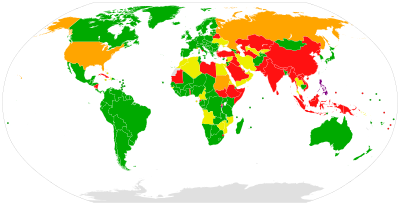Rome Statute of the International Criminal Court
| Rome Statute of the International Criminal Court | |
|---|---|

Parties and signatories of the Statute
State party
State party for which it has not entered into force
Signatory that has not ratified
Signatory that subsequently withdrew its signature
Non-state party, non-signatory
|
|
| Drafted | 17 July 1998 |
| Signed | 17 July 1998 |
| Location | Rome, Italy |
| Effective | 1 July 2002 |
| Condition | 60 ratifications |
| Signatories | 139 |
| Parties | 124 |
| Depositary | UN Secretary-General |
| Languages | Arabic, Chinese, English, French, Russian and Spanish |
|
|
|
The Rome Statute of the International Criminal Court (often referred to as the International Criminal Court Statute or the Rome Statute) is the treaty that established the International Criminal Court (ICC). It was adopted at a diplomatic conference in Rome on 17 July 1998 and it entered into force on 1 July 2002. As of March 2016, 124 states are party to the statute. Among other things, the statute establishes the court's functions, jurisdiction and structure.
The Rome Statute established four core international crimes: genocide, crimes against humanity, war crimes, and the crime of aggression. Those crimes "shall not be subject to any statute of limitations". Under the Rome Statute, the ICC can only investigate and prosecute the four core international crimes in situations where states are "unable" or "unwilling" to do so themselves. The court has jurisdiction over crimes only if they are committed in the territory of a state party or if they are committed by a national of a state party; an exception to this rule is that the ICC may also have jurisdiction over crimes if its jurisdiction is authorized by the United Nations Security Council.
The Rome Statute established four core international crimes: genocide, crimes against humanity, war crimes, and crime of aggression. Following years of negotiation, aimed at establishing a permanent international tribunal to prosecute individuals accused of genocide and other serious international crimes, such as crimes against humanity, war crimes and crimes of aggression, the United Nations General Assembly convened a five-week diplomatic conference in Rome in June 1998 "to finalize and adopt a convention on the establishment of an international criminal court". On 17 July 1998, the Rome Statute was adopted by a vote of 120 to 7, with 21 countries abstaining. Because the way each delegation voted was officially unrecorded, there is some dispute over the identity of the seven countries that voted against the treaty. It is certain that the People's Republic of China, Israel, and the United States were three of the seven because they have publicly confirmed their negative votes; India, Indonesia, Iraq, Libya, Qatar, Russia, Saudi Arabia, Sudan, and Yemen have been identified by various observers and commentators as possible sources for the other four negative votes, with Iraq, Libya, Qatar, and Yemen being the four most commonly identified.
...
Wikipedia
